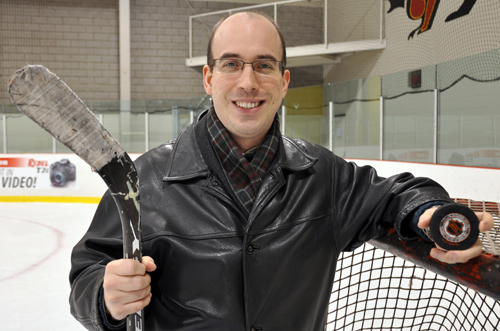
Hockey is Canada’s game, eh?
“We, as Canadians, want it to be ours,” says Andrew Ross, a post-doctoral researcher in the departments of Economics and History. “But sometimes we are reluctant to admit how much we owe to international influence, particularly British and American.” Ross is writing two books about the history of the National Hockey League from 1917 to 1967, which was also the subject of his PhD dissertation.
“I tell people I have a PhD in hockey, but I don’t play that well,” he jokes. All kidding aside, Ross wants people to take his research seriously. Despite the cult-like status of hockey in Canada, few researchers have taken an academic approach to the sport.
“People think of sports as a childish thing to study, but I try to make people understand that I’m doing it from a serious point of view, not just as a fan,” he says.
Of particular interest to Ross, who teaches a course on business history, is the commercial side of hockey.
“I am very much interested in Canadians and their relationship with hockey, and specifically what I perceived as people’s discomfort with seeing hockey as a commercial enterprise, seeing it as a business,” he says.
Organized hockey began in the British amateur tradition, where the only players who got paid belonged to the working class.
“The ethos of amateurism held that if you were a high-class person, you shouldn’t have to be paid to play,” says Ross. “Being paid to play marked you as working class. You were defining your class by refusing to be paid.” That class distinction has been replaced by professional hockey players who sign multi-million-dollar contracts and endorsement deals.
From the beginning, Canada was a hockey powerhouse in the international arena.
“Canada was the most dominant country in hockey,” says Ross. “We could basically send any team we wanted overseas and would usually destroy the opposition.”
But that wasn’t always the case. Canadian losses to Soviet teams after the Second World War prompted calls to the NHL to send professional players to international competitions.
“The ethos of amateurism prevented that from happening because professionals were being paid to play by definition and the international environment is an amateur environment,” says Ross.
That changed in 1998 when NHL players were allowed to compete in the Olympic Games.
The origin of hockey is another question for debate.
“The answer is that different people at different times invented versions of hockey,” says Ross, adding that the first games were played on frozen lakes and ponds. “People would get their sticks out and bat things around the ice.”
According to hockey lore, the “first” game was played in Montreal in 1875, even though many Canadians didn’t know about the sport at the time, and the Montreal Gazette reported that hockey was already popular in the U.S.
“Calling it Montreal’s game as opposed to Canada’s game is probably a better idea because that was the form that spread,” says Ross, adding that the city was the perfect birthplace for hockey with its winter sport-loving population and natural outdoor ice.
Initially, hockey could be played only in northern cities like Montreal, with winters that were cold enough to sustain ice for several months a year. Although the British developed the first leagues for a game that resembled hockey, they failed to thrive due to the country’s mild winters.
Canada lost its icy grip on hockey with the advent of indoor ice rinks, which allowed hockey to be played anywhere — even Texas, now one of the biggest hockey-playing states in the U.S.